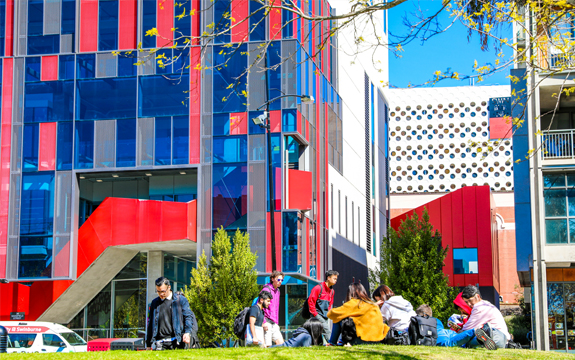Swinburne welcomes Australian Universities Accord plans to transform the tertiary sector

Swinburne University of Technology welcomes the Australian Universities Accord interim report.
In summary
- Swinburne University of Technology welcomes the Australian Universities Accord interim report
- The interim report aims to boost equity and fairness in the university system
- Professor Pascale Quester says the interim report is an important step forward in creating an innovative, equitable and modern sector
Swinburne University of Technology welcomes the Australian Universities Accord interim report, released today.
The interim report identifies five key issues for further immediate consideration and ten possible ‘system shifts’ to boost equity and fairness in the university system.
Swinburne Vice-Chancellor Professor Pascale Quester says the interim report is an important step forward in creating an innovative, equitable and modern tertiary sector.
“Our sector needs to be stronger, future-focused, resilient, and responsive to global ructions. The release of the Accord Interim Report is a positive first step in what is a once in a generation opportunity to improve the sector.”
“We need to support students to participate, particularly those from marginalised groups, who can face significant structural barriers to engagement, as well as challenges because of employer perceptions and financial constraints.”
“We must not waste this moment to improve the overall equity and fairness of the university system.”
Work-integrated learning and bringing VET and HE closer together
The interim report identified a number of key areas for further exploration that were canvassed in Swinburne’s submission to the Accords in April 2023.
The interim report quotes Swinburne’s submission on the importance of lifting the quality and availability of work integrated learning, an area that Swinburne is a sector leader in.
“For Australia to remain competitive now and into the future, our university graduates need to be work-ready, graduating with industry-relevant knowledge and skills. Work Integrated Learning (WIL) supports students to do just that, by applying and deepening their degree learning in authentic work settings and contexts,” the report quotes.
The review considers that Australian higher education would benefit from having a wider range of complementary institutions differentiated by their unique missions, one of the key elements of Swinburne’s bold and pragmatic vision for the future.
Also called out in the report is the need for more integrated Vocational Education and Training and Higher Education systems, starting in areas of national priority. This closely echoes Swinburne’s dedication to creating accessible education opportunities for all students as a dual-sector university.
Professor Pascale Quester has welcomed the government’s commitment to ongoing discussion to help shape the future of the tertiary sector, with the final Accords report due in December.
“The report highlights a number of areas that Swinburne is a national leader in, including the need for better inclusion and participation, flexible study, work integrated learning, future employment outcomes, and innovative research. We commend the government for joining us in recognising the importance of these areas.”
“We know the current model of university funding is not working. It pits universities against one another in a race for resources that stifles scientific and academic progress and limits access to those who need it most.”
“It is clear that the focus on ‘bigger is better’ falls short in so many ways. More of a focus is needed on championing universities of all different sizes, and ensuring student satisfaction, equity and experience are taken seriously.”
“The Accord offers promise for Swinburne to reach its full potential as a leading global university defined and inspired by technology, science and innovation, helping us to make a positive difference.”
“We look forward to working with the sector to champion change and shift to a more equitable focus on overall quality, access and impact.”
Supporting the Accord
In his address to the National Press Club, Minister Jason Clare announced immediate action in a number of areas, including Indigenous student access, abolishing barriers to receiving HECS-HELP and working across jurisdictions to improve university governance.
Removing the barriers to further education faced by many is of high importance to Swinburne, and we welcome these supportive measures.
The report estimates that 55 per cent of the workforce will have a university degree by 2050, aligning with the growing need for skilled workers. For this number to be achieved, ensuring every Australian is able to access higher education and work-integrated learning is crucial.
Swinburne also welcomes the recognition of the importance of putting First Nations people at the heart of Australia’s Higher Education system, including enhancing research capabilities, removing barriers to access and offering flexible options for study, employment, teaching and engagement.
The full interim report is available here.
-
Media Enquiries
Related articles
-

- University
Swinburne's response to the national Racism@Uni survey results
Swinburne's Vice-Chancellor Professor Pascale Quester has written to all members of the Swinburne community following the release of the Racism@Uni survey results and recommendations.
Tuesday 17 February 2026 -

- University
- Student News
Swinburne secures New Colombo Plan funding, expanding global opportunities for students
Swinburne has secured $943,000 in New Colombo Plan funding, expanding student opportunities for study, work and internships across the Indo-Pacific
Friday 06 February 2026 -
%20and%20Dr%20Heather%20Handley%20(Museums%20Victoria).%20Photographer%20-%20Tim%20Carrafa.%20Source%20-%20Museums%20Victoria%20(7).jpg/_jcr_content/renditions/cq5dam.web.256.144.jpeg)
- University
Museums Victoria and Swinburne University of Technology announce learning partnership
Museums Victoria and Swinburne University of Technology are proud to announce a new three-year partnership.
Wednesday 11 February 2026 -

- Technology
- University
World-first partnership with Adobe drives tech-fluency at Swinburne
Swinburne has become the first Adobe Creative Campus in the world to provide all staff and learners with Adobe Creative Cloud, including Adobe’s full offering of generative AI tools
Tuesday 27 January 2026 -

- Design
- Technology
- Health
- Law
- Education
- Business
- Science
- University
- Engineering
Swinburne moves up in Times Higher Education World University Rankings by Subject 2026
Swinburne University of Technology has performed strongly in the Times Higher Education World University Rankings by Subject 2026, with two subjects moving up the ranks.
Thursday 22 January 2026

